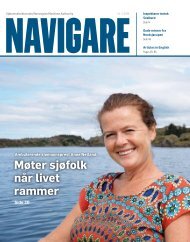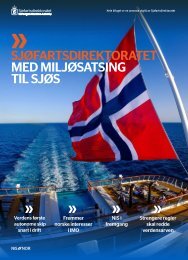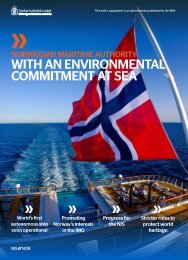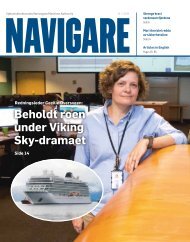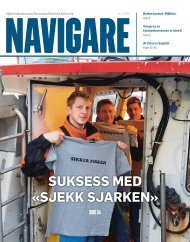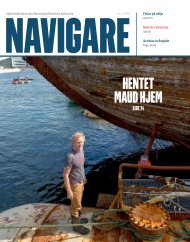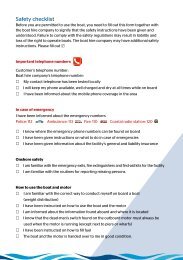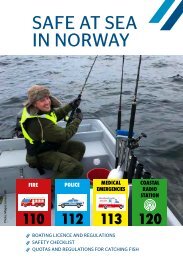You also want an ePaper? Increase the reach of your titles
YUMPU automatically turns print PDFs into web optimized ePapers that Google loves.
EDITORIAL<br />
STOP USING THE OCEAN<br />
AS A DISPOSAL DUMP<br />
ENGLISH TRANSLATION FROM PAGE 4<br />
For many years, there were no regulations<br />
governing disposal of garbage at sea, and in<br />
many ways, the ocean served as our collective<br />
disposal dump. In this country, it was<br />
not at all unusual that tin cans, old bicycles<br />
or prams were thrown into the ocean. Until<br />
recently, it was also common that uncleaned<br />
sewage went straight into the fjords. Within<br />
the shipping industry there were no regulations<br />
on what could be disposed of by<br />
throwing it overboard. Waste oil, food<br />
scraps and all kinds of garbage were therefore<br />
dumped into the ocean.<br />
One of the first to put pollution of the<br />
ocean on the agenda, was Thor Heyerdal.<br />
During his travels across the Atlantic with<br />
the papyrus reed boats Ra I and II, he came<br />
across vast areas of oil lumps and other<br />
pollution. He had not seen anything like this<br />
on his journey with the Kon-Tiki 20 year<br />
earlier. This gave rise to a strong and<br />
lifelong commitment to the environment.<br />
The pollution was documented through<br />
films, books, scientific articles and through a<br />
separate report issued by IMO, the maritime<br />
agency of the UN. The commitment of<br />
Thor Heyerdal drew great international<br />
attention and was a contributing factor to<br />
the IMOs passing of MARPOL in 1973.<br />
MARPOL is the international convention<br />
for the prevention of pollution from ships.<br />
Slowly but surely, regulations have been<br />
passed preventing us from disposing of<br />
things we do not want by throwing them<br />
into the ocean. Today, we have very strict<br />
rules for what can be released into the ocean<br />
from ships. Six annexes have gradually been<br />
added to MARPOL. These annexes state<br />
regulations for discharge of oil, harmful<br />
substances, sewage, garbage and air pollution.<br />
The task of the Norwegian Maritime<br />
Authority is to work preventative. This<br />
applies to safety, where we contribute to the<br />
prevention of accidents, but also to the<br />
environment, were we contribute to the<br />
Olav Akselsen<br />
Director General of Shipping<br />
and Navigation<br />
prevention of pollution from the shipping<br />
industry. We therefore work both nationally<br />
and internationally to develop rules and<br />
regulations to control shipping. If the<br />
regulations are to work as intended, it is<br />
important that inspections are carried out.<br />
In order to prevent violations of the<br />
regulations, safeguard environment and<br />
health, and ensure equal competitive conditions,<br />
inspections are decisive. Inspections<br />
are an important part of the work carried<br />
out by the Norwegian Maritime Authority.<br />
Through our inspections, we disclose<br />
violations of the regulations and at the same<br />
time prevent such violations of the regulations.<br />
Violations are heavily fined.<br />
Despite the fact that the shipping industry<br />
clearly is on the right path when it<br />
comes to the environment and discharge, it<br />
is still cause to be concerned for the health<br />
condition of the ocean. Several research<br />
reports show that there is still much to be<br />
concerned about when it comes to our<br />
ocean. Drastic measures must therefore be<br />
taken to prevent more pollution and to<br />
collect the garbage that has already ended<br />
up in the ocean. Fortunately, the ocean has<br />
once again been given great attention, and<br />
many initiatives have been taken to improve<br />
the conditions. The subject has top priority<br />
in Norway, and the UN also has the ocean<br />
high on the agenda.<br />
If we are to achieve results, it is important<br />
that we cooperate – cooperation<br />
between nations, as well as between the<br />
different participants in the shipping industry.<br />
The Norwegian Maritime Authority<br />
works actively and internationally to contribute<br />
to the reduction of pollution of the<br />
ocean. We also work with other public<br />
actors in Norway to reduce various<br />
discharge.<br />
Together with some of the other Norwegian<br />
participants, the Norwegian Maritime<br />
Authority has also chosen to take part<br />
in the project Circular Cleanup. The objective<br />
of the project is to find new solutions<br />
for effectively cleaning up plastic, more<br />
profitably and more circular. In addition,<br />
the project will focus on stopping the flow<br />
of plastic into the ocean.<br />
I would like to praise the Norwegian<br />
Shipowners’ Association for the initiative<br />
and thereby shown responsibility on behalf<br />
of the industry. At the same time, the initiative<br />
has pulled many different participants<br />
together to work towards a common goal,<br />
lasting solutions and a cleaner ocean.<br />
Unfortunately, a major clean-up is<br />
necessary, but most importantly the flow of<br />
new pollution to the ocean must be stopped.<br />
– We must stop looking at the ocean as a<br />
disposal dump!<br />
<strong>Navigare</strong> 4- <strong>2018</strong> | 57










